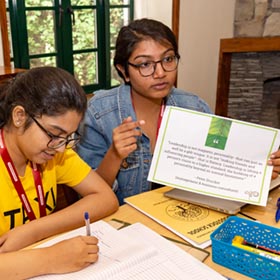A beginner EAL Programme is available for students in Grades 5 to 7. At this stage the EAL students have most of their lessons in the EAL classrooms. Initially, the student is withdrawn from English, Science, Foreign Languages, and Humanities.
As their English improves, they may join the mainstream class, first Science and later Humanities. Woodstock admits only students in Grades 5 to 7 for the beginner EAL Programme. This is to ensure that there is plenty of time for the students to reach the required level of English that will allow them to manage the demands of the IGCSE and AP curriculum.
The recommended entry level for the beginner course is Grade 5 or Grade 6. The regular EAL Programme includes students from Grades 5 to 8 and occasionally Grade 9. Here the students will work in smaller groups, at different levels, for language-based activities in the EAL classrooms.
These classes take the place of a foreign language. EAL teachers also work alongside students and teachers in the Grades 6 to 8 mainstream classrooms and provide support in English and Social Studies.
On arrival at Woodstock, it is important that Grade 8 and 9 students are already comfortably working at the intermediate level as recognised by the Common European Framework for Language Learning (CEFR). This means they will have the skills needed to participate in the IGCSE Programme.
Results of a TOEFL test may be required for students applying in Grades 10, 11 or 12. Once students have completed the intermediate programme, they will continue to be monitored by the ESL Department. This is to make sure progress in language is maintained alongside the increasing demands of the academic curriculum.
Additional support is always available for these students from the specialist EAL teacher.
 This cultural and linguistic diversity provides unique opportunities for all the students at the school.
This cultural and linguistic diversity provides unique opportunities for all the students at the school.

